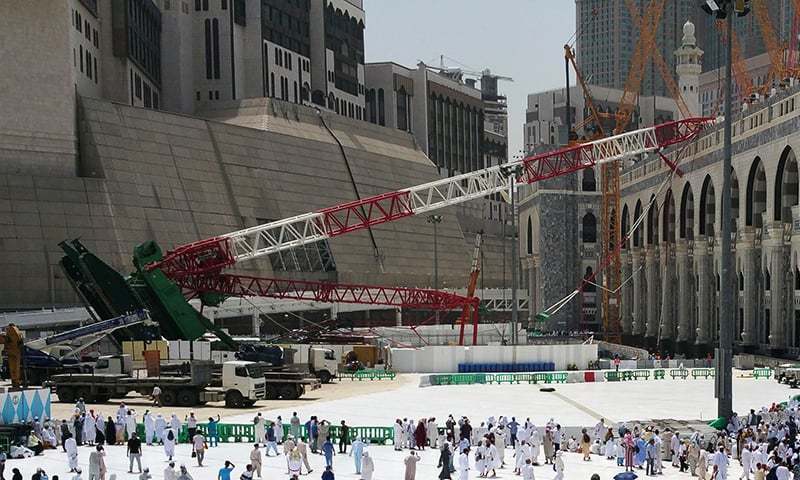The initial indictment stated that some of the crane operators, installers, and inspectors working on the site “lacked competence.”
Saudi Arabia has launched a new trial in the tragic incident involving the fall of a crane in the Grand Mosque in Mecca back in 2015 after all prior rulings were reversed by a judicial decision, according to local Saudi newspaper Okaz.
On 11 September 2015, prior to the start of the Hajj season, a crane collapsed in the Grand Mosque in Mecca due mainly to severe winds, killing 110 people and wounding 209 others, including foreigners.
Out of the 111 people who were killed, 25 were from Bangladesh, 23 from Egypt, and 15 from Pakistan. Nationals from 9 other countries were also killed in the tragedy.
According to the publication Okaz which cited unnamed sources, “the court proceedings have returned to ground zero seven years after the accident of the Holy Mosque crane.”
In January 2017, the Saudi Criminal Court dropped the charges against 13 defendants in that case, before the Court of Appeal overturned this ruling on 20 May 2017.
The defendants were acquitted on 4 August 2021, according to local Saudi media at the time.
Okaz explained that “the first round of the Supreme Court decided to overturn all the rulings issued, including the acquittal and its upholding” noting it will be re-examined again.
The outlet also confirmed that “the court held the first session of the new trial, in the presence of 10 of the accused, and the absence of three others despite their knowledge,” without mentioning the date of its convening, or the reason for their absence.
The first session witnessed the presentation of a list in which 13 individuals were accused of negligence.
The indictment stated that some of the crane operators, installers, and inspectors working on the site “lacked competence”, overall accusing the main contractor of “not hiring qualified workers and not providing adequate training for them .”
The indictment asserted that the crane operator did not provide specific information about the wind speed at which the cranes should be turned off, noting that the crane operator and safety officials were not provided with a weather forecast or bulletin.
The list pointed out that “the months prior to the incident witnessed a number of accidents that occurred or almost occurred, and the matter passed without corrective measures taken on the ground or lessons learned.”
The defendants asked, “a time limit to respond and see the cassation decision,” while the court decided to “give them an opportunity to submit response notes,” without specifying the date of the next session.







